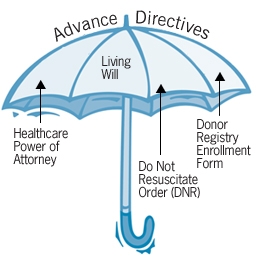What if you got into an accident and ended up in a coma and on life support? What if you developed dementia and couldn’t remember your past life? What would you do? More importantly, what would you want your friends and family to do on your behalf? By creating advance directives, your family members and friends know exactly what you would want if you ever got into a situation in which you couldn’t give consent.
Advance directives are
legal documents that let you stipulate your decisions about end-of-life care ahead of time, before these situations occur. They let you explain your wishes to your loved ones so there’s less confusion, grief or stress later on
[1]. Advance directives also make it easier and more efficient for doctors in deciding what care to give you—or not give you—so precious time is not wasted.
Living Wills
Living wills are instructions that deal with your medical care in cases when you’re unable to make your own decisions, either through unconsciousness, terminal illness, serious injury, coma, dementia, or other cases. It’s not difficult to imagine a situation in which your family might want to give you certain treatment that you’d, in fact, not want.

Living wills let you
think deeply about your values as a person, what you want in times of crisis, and how you think your incapacitation would impact your family and friends. It may be difficult to think about, but questions you can ask yourself are: would you want to be put on life support? How long would you want to stay on life support, knowing that it could cost your family money and take up space in the hospital? Would you want to be resuscitated if there’s no cure to your ailment? Would you want to keep living if you’d lost any connection to who you were before? Do you value independence and self-sufficiency, or family and being around them as long as possible? Would you want to refuse treatment no matter what? A living will can codify all of that. It’s important to
talk to your healthcare providers about creating a living will, so they can let you know what options you have available
[2].
Healthcare Power of Attorney
A healthcare power of attorney is a type of advance directive that lets you name the person who is allowed to make medical decisions for you when you are unable to. These people are also called proxies. Your proxy can be your spouse, sibling, parent, friend, religious leader, or anyone else you see fit. You can also have more than one proxy in case one of them is unable to fulfill their role.
Choosing a proxy is important: you want someone who knows you very well and who would best be able to carry out your decisions, even in unforeseen circumstances that a living will may not cover. When thinking about your proxy, or healthcare power of attorney, this person should be one who:

- Meets your province’s requirements for a health care agent
- Is not part of your medical professional team in any capacity
- Can be trusted to make decisions that conform to your values and wishes
A financial power of attorney is in charge of your finances while you are incapacitated—this person can be the same as your healthcare power of attorney, or a different person. You can choose who will be your power of attorney at any time, but it’s best sooner than later; if you don’t have a healthcare proxy, one will be provided for you
[3].
Creating an Advance Directive
Advance care directives aren’t just for older adults—anyone can download a template and create one. Life-changing medical situations can happen at any time, so it’s best to be prepared. Advance directive laws differ depending on the province you live in, and may be called different names. If you’re unsure, you can speak to a lawyer or your healthcare providers. If you make an advance care directive, you can send one to your healthcare provider to keep on file, and your family members. There are many
templates you can borrow to start writing your advance directives; the Joint Centre for Bioethics in Toronto has a few
[4]. When you’re finished writing yours, make sure of the following:
- Keep the original in a safe place
- Giving a copy to your doctor or other healthcare provider
- Talk to your family members about your advance directives
- Keep a card in your wallet stating that you have an advance directive, and the contacts of people who have a copy
- Keep a copy while travelling
Making Changes to your Advance Directives
You should always update your advance directives every few years, especially if there’s a change in: your values and attitudes; your proxy’s ability to fulfill their role; your health; your marital status. Always let your healthcare provider know when you are making the changes so they can keep an updated version in your medical record.
Problems with Advance Directives

Mainly, problems arise when there’s a lack of or conflict with information in your advance directives. Your family or medical provider might not know you had one, and administer treatment when you didn’t want it. Your family may be vehement in sticking to your will, even if it’s against the advice of your doctors. Someone who knows you well may claim that your attitudes have changed and your advance directives don’t reflect that. Being
careful and thorough about which information best corresponds with your personal values, and ensuring that those around you know how you will, can help alleviate some of the problems associated with advance directives.
It may be scary for some, but thinking about how you want your wishes to be respected when you’re unable to make decisions is important and necessary. Disaster can strike at any time, and, like with fire drills, it’s best to be prepared for as many situations as you can.

 Living wills let you think deeply about your values as a person, what you want in times of crisis, and how you think your incapacitation would impact your family and friends. It may be difficult to think about, but questions you can ask yourself are: would you want to be put on life support? How long would you want to stay on life support, knowing that it could cost your family money and take up space in the hospital? Would you want to be resuscitated if there’s no cure to your ailment? Would you want to keep living if you’d lost any connection to who you were before? Do you value independence and self-sufficiency, or family and being around them as long as possible? Would you want to refuse treatment no matter what? A living will can codify all of that. It’s important to talk to your healthcare providers about creating a living will, so they can let you know what options you have available [2].
Living wills let you think deeply about your values as a person, what you want in times of crisis, and how you think your incapacitation would impact your family and friends. It may be difficult to think about, but questions you can ask yourself are: would you want to be put on life support? How long would you want to stay on life support, knowing that it could cost your family money and take up space in the hospital? Would you want to be resuscitated if there’s no cure to your ailment? Would you want to keep living if you’d lost any connection to who you were before? Do you value independence and self-sufficiency, or family and being around them as long as possible? Would you want to refuse treatment no matter what? A living will can codify all of that. It’s important to talk to your healthcare providers about creating a living will, so they can let you know what options you have available [2].

 Mainly, problems arise when there’s a lack of or conflict with information in your advance directives. Your family or medical provider might not know you had one, and administer treatment when you didn’t want it. Your family may be vehement in sticking to your will, even if it’s against the advice of your doctors. Someone who knows you well may claim that your attitudes have changed and your advance directives don’t reflect that. Being careful and thorough about which information best corresponds with your personal values, and ensuring that those around you know how you will, can help alleviate some of the problems associated with advance directives.
Mainly, problems arise when there’s a lack of or conflict with information in your advance directives. Your family or medical provider might not know you had one, and administer treatment when you didn’t want it. Your family may be vehement in sticking to your will, even if it’s against the advice of your doctors. Someone who knows you well may claim that your attitudes have changed and your advance directives don’t reflect that. Being careful and thorough about which information best corresponds with your personal values, and ensuring that those around you know how you will, can help alleviate some of the problems associated with advance directives.